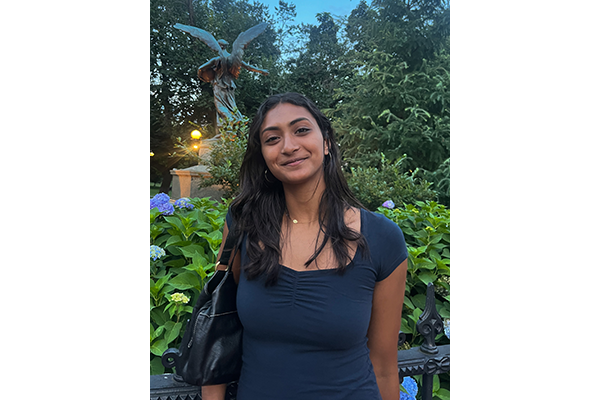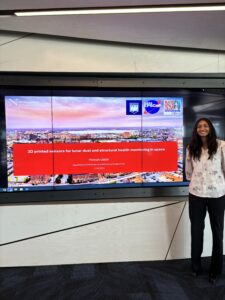Combined Major Creates World of Opportunities

Minnah Uddin, E’26, mechanical engineering and design, joined a double degree program to study two subjects she is passionate about and broaden her education and understanding of the two industries. Now completing her third co-op, she has been able to use what she has learned in the classroom to excel and succeed in any environment.
Minnah Uddin started her undergraduate studies at Northeastern University in 2021. She was highly interested in the university’s college of engineering, but also wanted to nurture her interest in art and design. She decided to double major in mechanical engineering and design in pursuit of her two passions. Uddin recognized that there are many benefits to combining these two programs. She said her unique degree program has given her different perspectives, helping to deepen her understanding of each discipline. She has been able to gain a wide variety of knowledge and skills that are applicable to almost any industry.
Uddin also chose Northeastern for their highly-respected co-op program and experiential learning opportunities. She wanted to graduate with various wide-ranging industry experiences that allowed her to apply her knowledge to real-world problems. She has completed two co-ops during her time at Northeastern and is currently on her third co-op experience.
Co-op at Insulet
Uddin’s first co-op experience was at Insulet Corporation as a manufacturing engineer co-op. Insulet makes the Omnipod, a small, tubeless and wearable insulin delivery device. Uddin’s role allowed her to have hands-on experience on the manufacturing floor, giving her unique insight into the engineering as an industry. This experience strengthened her understanding of the manufacturing process and has helped her apply that knowledge to her other co-op opportunities.
Roux NASA Aerospace Projects
After completing her co-op at Insulet, Uddin went on to her second co-op as a materials science and aerospace engineering research assistant co-op for Roux NASA Aerospace Projects. Uddin had the opportunity to work on three different aerospace projects, which exposed her to the diversity of endeavors in the aerospace industry. Her first project was in collaboration with the University of Maine, working with rainbow diffraction to detect strain. Strain influences “rainbow” diffraction patterns by altering their internal structure and creating an effect known as photoelasticity. The resulting colorful patterns indicate the areas of greatest mechanical stress. Uddin was tasked with figuring out how to imprint a rainbow diffraction grating surface onto 3D printed objects. One attempt involved projecting a rainbow pattern onto a tensile dog bone. The research aimed to create a low-cost strain gauge as an easy way to do structural health monitoring of objects.

Uddin giving a presentation on her projects at the Roux Institute.
Uddin’s second project involved working with lunar dust, the debris that covers the moon’s surface, while using the same diffraction grating surface in her previous project. Uddin explained that lunar dust is a major issue for astronauts due to its corrosive nature and how it can stick to everything, like solar cells and spacesuits. The researchers were hoping to figure out how to use the rainbow diffraction surface as a way to monitor lunar dust. Uddin ran various tests to simulate how the lunar dust would work in the actual environment and to see how the dust shows up in the light.
The third project Uddin completed aimed to figure out if scrap metal from the aerospace industry could be recycled and put back into other aerospace materials. Uddin was able to operate a ball mill to grind scrap metal into a powder in the hope that it could be reused to make metal again.
Uddin says her entire experience was incredibly memorable, and she was able to learn a vast amount about new technology and machines. She said this research experience challenged her to think out of the box and find solutions to novel problems. Uddin did not have previous research experience before her co-op, but was able to come out of the experience with a vast arsenal of new knowledge and skills.
In the Classroom
Uddin credits two courses for helping to prepare her for her co-op experiences. “Mechanics of Materials” and “Introduction to Materials Science” gave Uddin the skills needed in her co-op to thrive in her roles. She said both courses allowed her to build a solid foundation in material science. Uddin was thrilled to see the practical application of her classroom knowledge being used in her work experience. Additionally, being able to apply her knowledge helped solidify her understanding of the material even better.
Future Perspectives
Uddin will graduate from the mechanical engineering and design program in May 2026. She is currently completing her final co-op experience at Instron as a low-force applications and product management co-op. She attributes both her degree program and experiential learning opportunities to having led her to discover her interests in material science, mechanical testing, and hands-on work.
Uddin was recently accepted into the PlusOne program in product development, and she is excited to continue her education at Northeastern. This program combines business, engineering, and design, three subjects that Uddin is equally passionate about. She believes pursuing a master’s degree in product development will help elevate her knowledge and skills and lead to future leadership roles in the engineering industry.